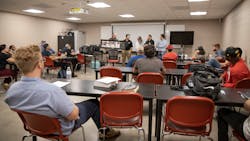Podcast from ASE and ExxonMobil offers answers to technician shortage
There are few, if any, in the transportation industry who have a firmer grasp of the vehicle maintenance skills gap than George Arrants, ASE Education Foundation’s vice president. The former automotive vocational tech teacher also chaired the Technology Maintenance Council’s SuperTech and Future Tech competitions from 2005 to 2018, where he is still involved in a smaller capacity. He’s also a regular contributor for Fleet Maintenance.
And there are fewer still who are so candid about the systemic issues at fleets regarding the recruiting and retention of maintenance technicians, and what companies can do about the perceived labor shortage. Bureau of Labor Statistics data from 2019 indicated the sector needs to hire 24,500 new techs every year over the next 10 years to replace its aging workforce. The current workforce is around 281,000.
For proof, just queue up the recently launched podcast “The Long Haul with George and Paul” on Spotify, iTunes, or web browser. Produced by ExxonMobil and co-hosted by Paul Cigala, ExxonMobil CVL Applications Engineer (and vice-chair of the TMC S.3 Engine Study Group), the series has three episodes so far, with more on the way if the people want it. And they should, as the 35-minute on average podcasts are brimming with best practices on how to cultivate and keep top-tier talent in the maintenance bay.
The major takeaway, according to Arrants, is that one shouldn’t get discouraged by the data.
“My concern is that we throw around numbers that may be exaggerated,” he said. “And if the numbers are too big people say, ‘Well, there's nothing I can do, so why get involved? Because I'm not going to make a difference.’”
Arrants and Cigala, along with their guests, so far have proven that differences can be made, and that labor deficit can be managed, by those willing to put in the work [which they discuss in the Q&A below].
Guests so far have included TMC Executive Director Robert Braswell, Betts Company CEO Mike Betts, Lee Kirby, PepsiCo senior fleet manager, and Marcus Myers, Gulf Relay senior director of fleet maintenance.
We spoke to both Arrants and Cigala recently on what value the podcast provides, why it’s necessary, and some of the best practices they have found that can immediately help fleets and shops improve their talent pool.
Fleet Maintenance: How did the podcast come about and how does it help solve the technician shortage?
Paul Cigala: ExxonMobil has been involved with TMC and SuperTech, in particular, as far as running a station and helping our customers that send technicians to SuperTech. We know that there are technicians out there, but are the technicians qualified to be able to step into their roles and meet fleets’ needs?
George Arrants: I've been asking for a while, “Do we have a shortage—or do we have a shortage of qualified applicants? When you talk to most employers, they say, “Well, no, we've got applicants; they're just not qualified.”
That means we don't have a lack of interest in our industry; we have a lack of qualified applicants. And just in our accredited schools, we impacted over 115,000 students last year in transportation programs. And accredited schools maybe make up 45 or 50% of the total programs in this country. So if you figure during COVID we're impacting 115,000, you’ve got to figure the other 50% is probably fairly close to that. That's a large number of people. And if we have that many people interested, we just have got to get involved.
But if we don't get all of those students through the pipeline and into the workforce, well, that's the leaky pipe. Let's figure out what's causing those leaks and fix them.
What Paul and the folks that Exxon Mobil and other companies are doing is getting involved to try to help with solutions. And a lot of these solutions are very simple.
FM: So where are the leaks?
GA: In a ASE 2018 survey of students and graduates, we found almost 18% of students taking auto tech programs want to work on trucks. And like 4 or 5%, wanted to work in parts. It's just that their high school or community college doesn't offer it. So they take the next best thing. There's a huge pool to draw from there. it also said that,
And in the spring of last year, we surveyed nearly 1,400 high school automotive students, and for those that were not taking the next class offered in succession, the number one reason that they were not taking the class was no defined career path. Thirty percent listed that. The next one in line was what we expected to be number one: course scheduling conflict.
We're finding those students that get involved with any form of work-based learning—whether it's just generic work-based learning, an internship or a registered apprenticeship—experienced what to expect in the workplace before they graduate and they stay with us long-term.
If we're not willing to invest in those work-based programs, they're disappearing. They graduate on Friday and on Monday, they stop in the fleet. And they're just shocked, because there was no transition. We're seeing a terrible loss with that group of students.
That survey also showed that from graduation till two years out, we lose 41%. We lose 20% right at graduation and another 21% in the first two years.
FM: What do fleets and shops have to do to appeal to these students?
GA: It's not about money. It's giving up a little of your time to get involved in your local school. Let them know who your brand is. If you're in the community, but nobody knows who you are, and you show up on a career fair day, you're just another table with useless trinkets. But if you can come in and be a guest speaker, or have them come visit your maintenance facility, or get involved in the advisory committee, a lot of times, that little bit of your time and your talents is all it takes.
PC: Some of the fleets that we have on the podcast will talk about onboard and mentoring and setting curriculum at these schools.
They're developing the technicians that they want to come into their fleet. I started my career as a diesel mechanic, I went to tech school, and it was very well-rounded—but a lot more focused on engines. And that's not the first thing the technician is going to work on when it comes into a fleet. They're going to be working on electrical systems or diagnostics or sensors—engines are well down the road. No fleets is going to trust an entry-level technician with a $40,000 engine.
Related: How mentorship programs can help combat the technician shortage
GA: If they can't do preventive maintenance, or lookup service information or write on a repair order, they're virtually unemployable. We take those things for granted sometimes, but when industry talks to education, things change.
PC: Even in technical schools, we see gaps we can help close. Just basic knowledge of used oil analysis, how to take and test a coolant sample.
FM: How is that fixed?
GA: The only way the schools are going to know it's important to fleets and customers is if those fleets come in and explain to them they are not going to work on engines right away, so they need to learn about lubricants and the coolant, and everything that goes through that engine that to be correct. And that's where you make the difference.
PC: And technicians need to be trained to understand when they get a report back, where some of those contaminants are coming from and how to make a repair. That's huge. And that's what we continue to do between TMC, ASE and our fleet customers: train them to be able to read and understand and what what to be on the lookout for.
In part 2, Arrants and Cigala discuss onboarding, training and retention of entry-level technicians.About the Author

John Hitch
Editor-in-chief, Fleet Maintenance
John Hitch is the award-winning editor-in-chief of Fleet Maintenance, where his mission is to provide maintenance leaders and technicians with the the latest information on tools, strategies, and best practices to keep their fleets' commercial vehicles moving.
He is based out of Cleveland, Ohio, and has worked in the B2B journalism space for more than a decade. Hitch was previously senior editor for FleetOwner and before that was technology editor for IndustryWeek and and managing editor of New Equipment Digest.
Hitch graduated from Kent State University and was editor of the student magazine The Burr in 2009.
The former sonar technician served honorably aboard the fast-attack submarine USS Oklahoma City (SSN-723), where he participated in counter-drug ops, an under-ice expedition, and other missions he's not allowed to talk about for several more decades.


